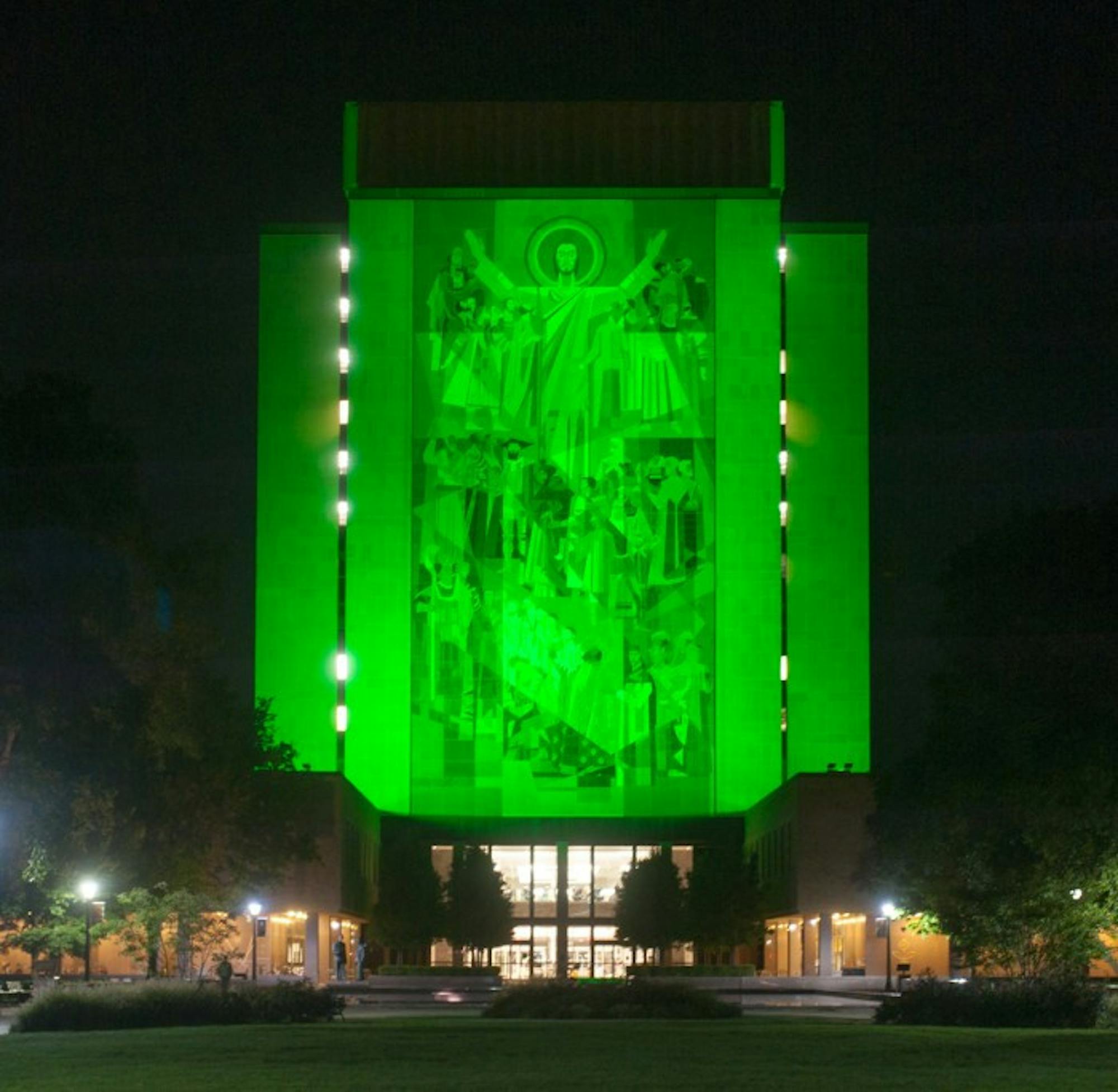A green light will shine on Touchdown Jesus each night this week, junior Ally Zimmer said. And it’s not for the reason people may think.
Zimmer said she heard a rumor the green light was supposed to symbolize sustainability.
“I don’t think that even makes sense,” she said with a laugh. “Because instead of using these big green energy-using lights, why wouldn’t you just turn them off to save energy?”
Others have speculated that the green light is another showing of support for the Notre Dame football team, Zimmer said.
“It’s something that catches everyone’s attention,” she said.
But that’s not why the iconic mural on the side of Hesburgh library is lit green. This is, in fact, the third year in a row a green light has illuminated Touchdown Jesus during the first week of October.
It’s all for Irish State of MiND: Mental Health Awareness Week.
“The main goal of the week is to start conversations about mental illness and to make it something we don’t just ignore and set aside,” Zimmer said. “We want to make it something people can feel comfortable talking about.”
Zimmer is the president of Notre Dame’s chapter of the National Alliance on Mental Illness (NAMI-ND), the organization in charge of planning the week of events designed to spark discussions about mental illness around campus.
“This is Mental Illness Awareness Week,” she said. “We market it as Mental Illness Awareness Week. ... Often it gets changed to Mental Health Awareness Week when other people talk about [it] — which I don’t have a problem with. It’s just not what the week is all about.
“I think, on some level, there’s stigma everywhere that prevents us from saying stuff about mental illness.”
However, from 2009 to 2015, the rate of the University Counseling Center (UCC) has gone up by 38.2 percent, Maureen Lafferty, assistant director for training and staff psychologist, said.
“That’s the good news,” Lafferty said. “I’m glad we’re working to reduce the stigma and get the word out about the mental health services we have.”
Lafferty said the largest number of cases the UCC handles is anxiety-related. Students can come in to talk about anything, she said, including depression, academic worries and family-related issues.
Located on the third floor of St. Liam Hall, the UCC offers a number of new and improved services this year, Lafferty said, including individual and group therapy sessions, increased after-hour counseling services and a new online form of therapy.
Therapist Assisted Online (TAO) is a web-based program used at other colleges and universities, Lafferty said. It was designed to give students with busy schedules the ability to access counseling resources during short blocks of time.
“For the right person, it can be very effective,” Lafferty added.
The UCC also offers “Let’s Talk” consultations twice a week, a time for students to stop by for 15 minutes and talk with a trained staff member. The session is free and requires no paperwork, Lafferty said. It’s designed for those who simply want to ask questions or discuss a concern.
“It’s a way of increasing access and decreasing stigma for students,” Lafferty said.
Students can also turn to the McDonald Center for Well-being (McWell) to maintain a healthy mental state, Mara Trionfero, assistant director for assessment and education, said.
McWell focuses on promoting the eight dimesions of well-being on campus, Trionfero said. This includes emotional well-being.
“Emotional well-being refers to … a positive self-concept, which includes dealing with feelings constructively and developing positive qualities such as optimism, trust, confidence and determination,” she said.
Students can sometimes neglect their emotional well-being when they prioritize other aspects of their life, Trionfero said. McWell offers resources — such as drop-in yoga on Tuesdays or monthly meditations at the Snite Museum of Art — to help remind students to maintain a healthy state of mind.
Trionfero said McWell promotes mindfulness — a sense of awareness of one’s body, thoughts and feelings.
“It really is like a muscle,” she said. “It takes practice.”
The ultimate goal — in line with the goal of Irish State of MiND Week — is to make students feel comfortable talking about their health and well-being, Trionfero said.
“We talk a lot about creating a culture of listening to each other and really allowing people to be authentic, especially when they’re struggling,” she said.
All in all, the week is supposed to be a way for students to do just this, Zimmer said.
“It’s about what we see at Notre Dame, what we want to see and how we can really make a difference in starting conversations — in making it easier to talk about mental health and what the barriers to those conversations are,” she said.
Everybody notices the green light on Touchdown Jesus, Zimmer said. Now, she hopes they’ll start asking questions about it.
“It’s really become an icon of what we’re doing for NAMI,” she said. “Touchdown Jesus is such an iconic part of Notre Dame — so it’s become a symbol of what our club is doing combined with the community we’re doing it in.”













